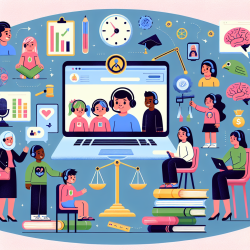Leading with Vision: Empowering Practitioners Through Informed Leadership
The COVID-19 pandemic has been a stark reminder of the critical role that competent leadership plays in managing public health crises. The research article "COVID-19 Blind Spots: A Consensus Statement on the Importance of Competent Political Leadership and the Need for Public Health Cognizance" highlights the essential skills and knowledge required by leaders to effectively navigate such challenges. As practitioners, especially those involved in special education and therapy services, understanding these insights can significantly enhance our ability to deliver quality care and support to our communities.
Key Takeaways for Practitioners
The research underscores several "blind spots" that emerged during the pandemic, offering valuable lessons for practitioners:
- Politicization of Processes: It is crucial to separate political influences from public health decision-making. Practitioners should advocate for evidence-based approaches and rely on expert consultation to guide their practices.
- Complacency and Vigilance: Continuous education and vigilance are necessary to stay ahead of potential resurgences. Practitioners should remain informed about the latest public health guidelines and adapt their practices accordingly.
- Nonpharmacological Measures: Simple measures like social distancing and mask-wearing have proven effective. Practitioners should encourage adherence to these practices within their communities and settings.
- Addressing Concomitant Health Challenges: The pandemic has highlighted the importance of managing chronic health conditions and mental health. Practitioners should integrate these considerations into their service delivery models.
- Combating Pseudoscience: Misinformation can undermine public health efforts. Practitioners should engage in fact-checking and promote scientifically sound information to their clients and communities.
Implementing Research Outcomes
Practitioners can implement the outcomes of this research by:
- Enhancing Leadership Skills: Engage in professional development opportunities that focus on leadership in public health contexts. This can be achieved through webinars, conferences, and networking with experts in the field.
- Promoting Interdisciplinary Collaboration: Collaborate with public health officials, educators, and other stakeholders to develop comprehensive strategies for managing health crises within educational settings.
- Advocating for Evidence-Based Policies: Use your voice to advocate for policies that prioritize scientific evidence and expert guidance in decision-making processes.
- Encouraging Community Engagement: Foster a culture of community engagement and education, empowering individuals to make informed decisions about their health and well-being.
Encouraging Further Research
While the research provides a comprehensive overview of the challenges and solutions, it also highlights the need for ongoing investigation into effective leadership during health crises. Practitioners are encouraged to participate in or support further research efforts to expand our understanding and improve our responses to future challenges.
To read the original research paper, please follow this link: COVID-19 Blind Spots: A Consensus Statement on the Importance of Competent Political Leadership and the Need for Public Health Cognizance.










